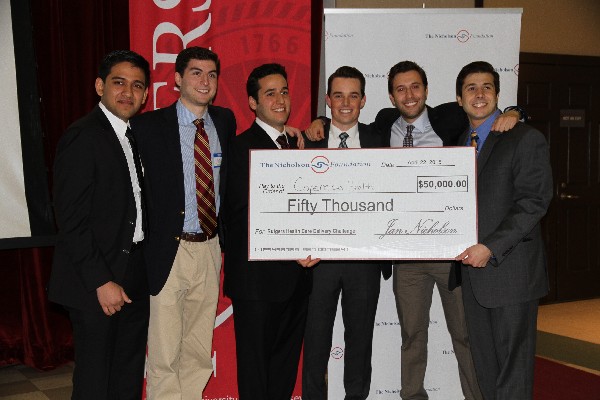All New Jersey Team Takes Home $50K Prize in Nicholson Foundation & Rutgers Health Care Delivery Challenge

A smartphone app aimed at helping underserved populations manage Type 2 diabetes to reduce health care costs took first prize at the Nicholson Foundation & Rutgers Health Care Delivery Challenge Award Ceremony, on April 22 at Rutgers University–New Brunswick. The winning team, “Copernicus Health,” received $50,000 to implement their innovation at a Rutgers-affiliated clinic.
The ceremony was the culmination of the four-month Challenge competition, an annual event managed by Health 2.0 and funded by the Nicholson Foundation.
The winning team members were Rutgers undergraduate computer-science student Jeet Patel; and second-year medical students Tom Nahass (Montgomery), Josh David (Englewood), Brian Friel (Montgomery), Jonathan Haskel (Morristown,), and Sam Schild (Millburn). All the medical students are from Rutgers Robert Wood Johnson Medical School.
Using gamification, the application allows patients to receive points for taking their medicine, self-educating about their disease through the app’s embedded learning tools, and monitoring key clinical metrics obtained at the doctor’s office.
Once patients accumulate a predetermined number of points, they become eligible for rewards in the form of direct cash infusions sent to their reloadable Copernicus debit cards or discounts at healthy-lifestyle businesses, such as fitness centers and farmers’ markets.
To help ensure accuracy and real health improvements, users are only eligible for cash rewards after having their lab values verified by their physicians.
According to Nahass, the team came up with the idea for the app after “discussing the various problems that affect our vulnerable patient community in New Brunswick. Our research pointed us toward type 2 diabetes. Some of the most costly adverse outcomes stemming from improper disease management are also some of the most preventable by making lifestyle changes.
“With the current healthcare system moving toward paying for performance, physicians and hospitals are being reimbursed for meeting specific criteria for various clinical metrics, one of these being specific lab values. We felt that if the insurer, hospital, and physician are being rewarded, why not reward the patient, who is doing all of the hard work to meet these metrics? It is this thought that got us passionate about bringing our platform to our community and beyond.”
Developing the app wasn’t a piece of cake for a team composed primarily of medical students, but Nahass likened it to learning about medicine. “Once you learn the vocabulary, it’s much easier to apply it in practice. In order to communicate our idea for the application, we all learned a little about the process itself,” he said.
Also, “from a practical standpoint, we had to learn about our target patient population, which consists of patients from various socioeconomic backgrounds and literacy levels. Therefore, the application had to not only be effective, but extremely user-friendly and simple. We also have learned a tremendous amount about our patient population and the enormous cost burdens chronic disease places on our society.”
The team has a very basic iPhone app right now that performs many of the major functions. “However, there are many features that need to be included before we roll it out, said Nahass. “It was extremely valuable to learn how best to communicate with our developer so that we can use this experience as we seek design firms to complete our backend along, with mobile applications, for a more complete MVP.”
NJTechWeekly.com asked Nahass about the team’s plans for the $50,000. “In order for us to get it right, we are spending a large portion on development, not only to ensure a great user experience, but also to protect our patients’ data. The other large portion will be reserved for the financial incentives that we plan to give to patients for improving their health.”
The Nicholson Foundation funded the Healthcare Delivery Challenge as part of its commitment to stimulating a culture of innovation across New Jersey’s healthcare institutions serving at-risk populations.
“The students and faculty from the Rutgers community are helping to lead the way for a healthier New Jersey for all residents,” said Joan Randell, chief operating officer of The Nicholson Foundation.
Submissions were judged on the following criteria: creativity, impact (i.e., ability of the intervention to improve health outcomes of vulnerable populations and reduce costs within a year’s time), feasibility of implementation, and sustainability.
The judges at this year’s event were Michael Wiley, senior director, ventures and commercialization, at the Foundation Venture Capital Group; Mark Robson, former dean of the agricultural and urban programs at Rutgers’ Department of Entomology; Denise Rodgers, vice chancellor for interprofessional programs at Rutgers Biomedical & Health Sciences; Wen Dombrowski, aging, healthcare, and technology advisor for Resonate Health; Frank Sonnenberg, medical director of clinical information systems and professor of medicine at the RWJMS; Eric G. Jahn, senior associate dean for community health at the RWJMS; Sabrina M. Chase, assistant professor and director, Joint Urban Systems Ph.D. Program in Urban Health; Jasmine Cordero, managing director of the Center for Urban Entrepreneurship & Economic Development, at Rutgers Business School; and Gary Minkoff, instructor of professional practice at Rutgers Business School, Department of Management & Global Business.

